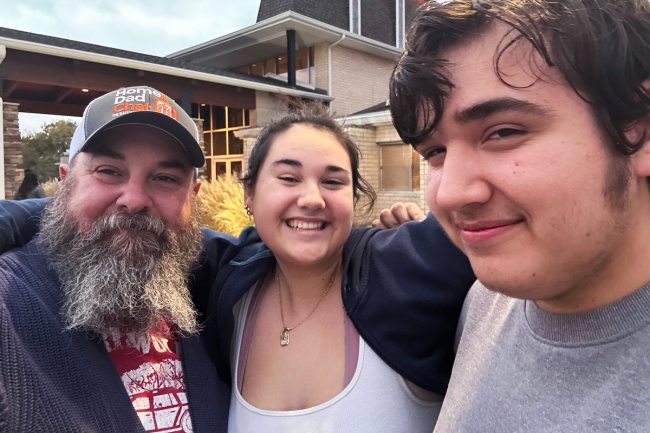You have /5 articles left.
Sign up for a free account or log in.

Shannon, Genevieve and Wyatt Carpenter pose outside their polling location in Missouri after a long road trip from Genevieve’s university in Arkansas.
Shannon Carpenter
Throughout the day on Nov. 4 and 5, confused voters in various states reported troubles with absentee voting. Some never received the ballots they asked for, or they received them too late. (Some states require that mail-in ballots arrive by the time polls close on Election Day in order to be counted.) Others submitted their ballots but found they were rejected or never arrived.
Voting intentions and issues: Absentee voting difficulties can have an especially strong impact on college students. About a third of students who responded to an Inside Higher Ed/Generation Lab flash poll conducted in late September said they were planning to vote absentee or by mail. That share was even larger—45 percent—among students who go to college in a different voting district than their permanent address.
Theresa J. Lee, a senior staff attorney with the American Civil Liberties Union’s Voting Rights Project, is currently representing voters in Cobb County, Ga., whose absentee ballots were never delivered because of an error by the county. But she said there is no reason to believe anecdotes from elsewhere in the country are connected to Cobb County’s issues or are otherwise part of a systemic issue.
“In general, there’s always been not-mal-intentioned election administration hiccups,” she said.
One family’s story: By Monday, Nov. 4, Genevieve Carpenter, a first-year student from the suburbs of Kansas City, Mo., who attends the University of Arkansas, still hadn’t received her mail-in ballot for Tuesday’s general election. So her father, Shannon, jumped into action.
“She filled out the paperwork [to request a mail-in ballot], she got it notarized, she sent it off. Friends around her got theirs, but hers never showed up,” he said in a phone interview with Inside Higher Ed.
Shannon got in his car, drove three and a half hours to Fayetteville to pick up Genevieve, brought her back to the polls in Missouri to vote in person and then returned her to campus—all on Election Day. He had initially wanted to set out for Fayetteville on Monday, but tornadoes in the region interrupted his plan.
By the time he returned his daughter to her dorm, it was midnight; he had been in the car for about 12 hours all told. He decided to stay in a hotel before heading home the next morning.
He was willing to drive hours to help his daughter cast her ballot because he feels strongly that people should exercise their right to vote—something he has worked to instill in his children by taking them to the polls every election since their birth, he said.
He acknowledged that the journey was not only time-intensive and tiring, but also costly; he spent money on gas and the hotel he stayed in Tuesday night, as well as on meals.
“There’s a real financial cost to this that I understand a lot of people, a lot of college students, can’t pay to get this done. That is concerning for something that should be free and easy to do,” he said.
But he was also grateful to spend time with his daughter and son, who accompanied him on the road trip.
What other students did: Elsewhere across the country, students reported lengthy drives—and, in some cases, flights—to their home states to cast ballots.
Several news outlets reported that Lexi Harder, a graduate student in Germany who hails from Montgomery County in the battleground state of Pennsylvania, flew 15 hours to vote after her ballot was unexpectedly returned to her.
“It’s definitely priceless. I would have paid triple that to come back,” Harder told 6 ABC.
Some students opted to vote in person where they attend college once it became clear their ballots weren’t coming, using a provisional ballot or same-day registration to make the last-minute switch.
Mya Tolbert, a student and first-time voter at Towson University, told Inside Higher Ed on Election Day that she decided to vote in person at the university’s campus polling site when her absentee ballot failed to come in the mail. Luckily, she had a gap between classes, so she could stand in line for over an hour.
What have you done to support students who are struggling with election outcomes? Tell us about it.




